Active Native Bovine TSH Protein
| Cat.No. : | TSH-1315B |
| Product Overview : | Native bovine thyroid stimulating hormone was purified from bovine pituitary gland. |
| Availability | January 19, 2026 |
| Unit | |
| Price | |
| Qty |
- Specification
- Gene Information
- Related Products
- Case Study
- Application
- Download
| Species : | Bovine |
| Source : | Bovine Pituitary Gland |
| Tag : | Non |
| Description : | The four human glycoprotein hormones chorionic gonadotropin (CG), luteinizing hormone (LH), follicle stimulating hormone (FSH), and thyroid stimulating hormone (TSH) are dimers consisting of alpha and beta subunits that are associated noncovalently. The alpha subunits of these hormones are identical, however, their beta chains are unique and confer biological specificity. Thyroid stimulating hormone functions in the control of thyroid structure and metabolism. The protein encoded by this gene is the beta subunit of thyroid stimulating hormone. Mutations in this gene are associated with congenital central and secondary hypothyroidism and Hashimoto's thyroiditis. |
| Bio-activity : | 30 IU/mg |
| Quality Control Test : | FSH Contamination: 0.05% LH Contamination: 0.006% GH Contamination: 0.002% PRL Contamination: 0.001% |
| Storage : | Prepare aliquots and store at < -20 centigrade. Avoid freeze/thaw cycles. |
| Reconstitution : | It is recommended to reconstitute the powder in physiological saline (pH 7.0) and 0.5% BSA is desirable to retard absorption to glass. |
| Publications : |
| ◆ Recombinant Proteins | ||
| TSH-02H | Recombinant Human TSH protein | +Inquiry |
| TSH-40H | Recombinant Human TSH protein | +Inquiry |
| TSH-42H | Recombinant Human Thyroid Stimulating Hormone | +Inquiry |
| TSH-01H | Recombinant Human Thyroid Stimulating Hormone(TSH) Protein, His-tagged | +Inquiry |
| TSH-11B | GMP Recombinant Bovine TSH protein, His-tagged | +Inquiry |
| ◆ Native Proteins | ||
| TSH-1315B | Active Native Bovine TSH Protein | +Inquiry |
| TSH-10B | Active Native Bovine TSH Protein | +Inquiry |
| TSH-108H | Active Native Human Thyroid Stimulating Hormone | +Inquiry |
| TSH-25H | Active Native Human Thyroid Stimulating Hormone protein | +Inquiry |
| TSH-1312B | Active Native Bovine TSH Protein | +Inquiry |
Case 1: Rogers E, et al. Front Toxicol. 2024
Interference with the synthesis of thyroid hormone (T4) can lead to developmental, metabolic, and cognitive impairments. Due to differences in the sensitivity of different species to chemicals, in vitro methods based on human cells are needed to reproduce thyroid cell structure and T4 production for screening purposes. The study used primary human thyroid cells isolated from healthy adult donors and cryopreserved, which showed a high EpCAM positive rate and a proportionate CD90 positive rate after thawing. The cells were cultured on a 96-well plate and were able to form 3D microtissues within 4-5 days after the addition of bovine thyroid stimulating hormone (TSH). These microtissues remained stable in shape and size during the 14-day culture period. Both thyroglobulin (TG) and T4 were the highest when the proportion of CD90 positive cells, inoculation density and TSH concentration were suitable. At maximum TG and T4 production levels, the average diameter of the microtissue is between 50 and 200 microns. Two typical TPO inhibitors, 6-propyl-2-thiourea and methimazole, had T4 IC50 values of approximately 0.7 micromol and 0.5 micromol, respectively, in microtissue cultures treated on days 9 to 14.
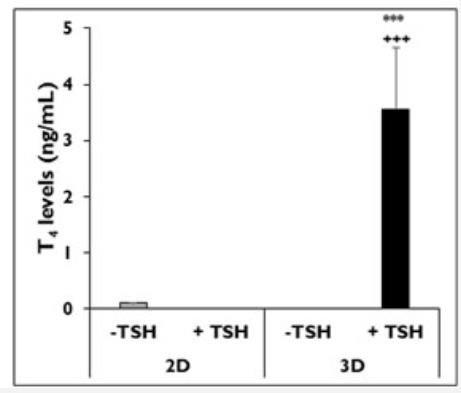
Fig1. Thyroxine (T4) on day 14 from thyrocytes in 2D and 3D culture treated without and with TSH.
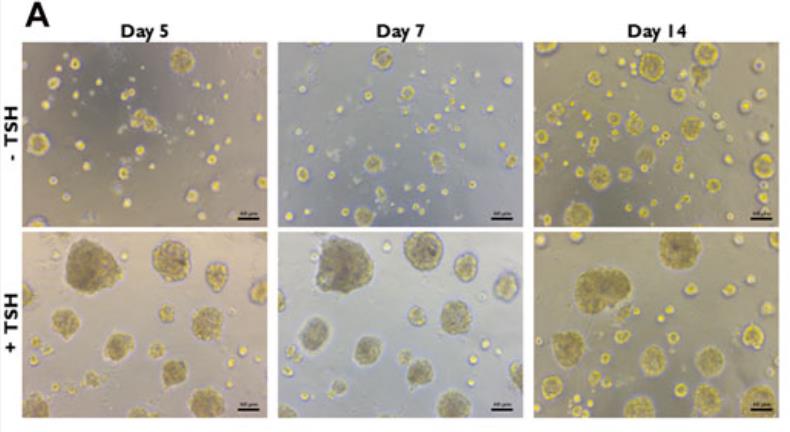
Fig2. Representative images of microtissues treated without (−) or with (+) Thyroid Stimulating Hormone (TSH).
Case 2: Zhang Y, et al. Dis Markers. 2022
There is substantial evidence that thyroid stimulating hormone (TSH) levels are associated with insulin resistance in fat cells, but the underlying mechanism is unclear. The purpose of this study was to investigate the role of TSH in inhibiting insulin receptor substrate-1 (IRS-1) expression and tyrosine phosphorylation of IRS-1.
The researchers differentiated mouse 3T3-L1 preadipocytes into adipocytes, which were then treated with different concentrations of bovine TSH. The concentration of tumor necrosis factor-α (TNF-α) was determined by enzyme-linked immunosorbent assay (ELISA), and the DNA-binding activity of nuclear factor κB (NF-κB) was quantified by electrophoretic mobility change assay (EMSA). The levels of IRS-1 and tyrosine phosphorylation in adipocytes were detected by Western blotting and immunoprecipitation, respectively.
TSH was found to induce TNF-α secretion in a dose-dependent manner and positively correlated with NF-κB DNA-binding activity. Tsh-treated adipocytes inhibited insulin-stimulated IRS-1 tyrosine phosphorylation, but promoted TSH-dependent TNF-α secretion and NF-κB DNA-binding activation. These effects were significantly inhibited by BAY 11-7082 and H89, and were completely blocked by the TNF-α antagonist WP9QY.
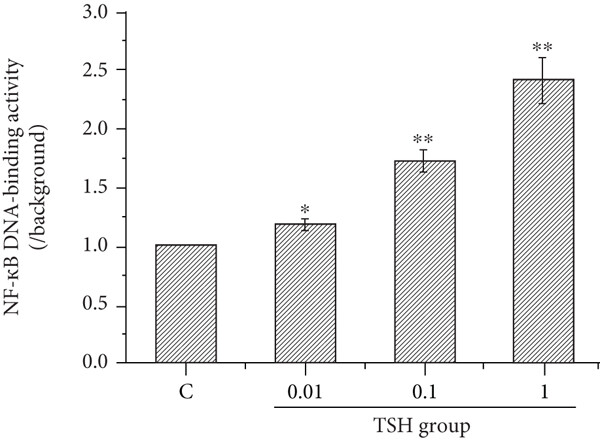
Fig1. Effect of TSH on the DNA-binding activity of NF-κB in 3T3-L1 adipocytes.
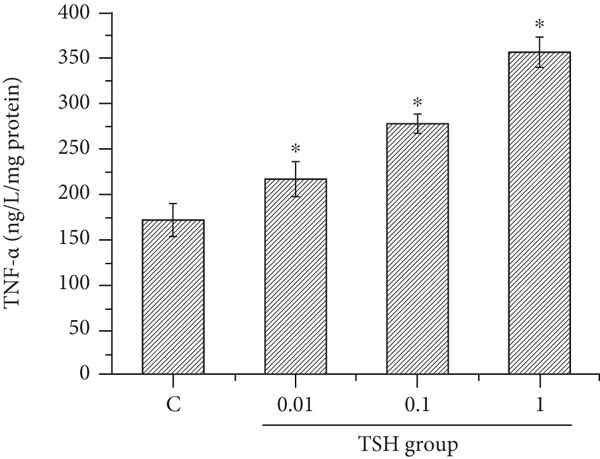
Fig2. TSH-stimulated 3T3-L1 adipocytes produce TNF-α.
Bovine thyroid stimulating hormone (TSH, B-TSH) is a protein hormone secreted by the anterior pituitary gland, its main function is to stimulate the thyroid gland to secrete thyroid hormone, thereby regulating metabolism, growth and development and other physiological processes.
Bovine TSH has been used to test thyroid function, and serum B-TSH level will increase in hypothyroidism. In hyperthyroidism, serum B-TSH levels are reduced.
In the treatment of thyroid cancer, Bovine TSH has been used to increase iodine uptake in patients to facilitate radioactive iodine therapy. However, the clinical use of Bovine TSH has been greatly reduced because of the adverse immune reaction it may cause, and recombinant human TSH (rhTSH) is more commonly used. Bovine TSH has been used in clinical practice to assist in the diagnosis of thyroid related diseases, but has been replaced by rhTSH due to the above-mentioned immune response problems. rhTSH has the same α and β subunits as human pituitary TSH, and can strongly stimulate the secretion of T4, T3 and thyroglobulin (Tg) in healthy volunteers.
B-TSH can be used as carrier protein to target delivery of other bioactive substances (such as drugs, vaccines, etc.) to improve the bioavailability and efficacy of drugs. In addition, the biological characteristics of B-TSH can also be used to develop new biosensors and biomaterials.
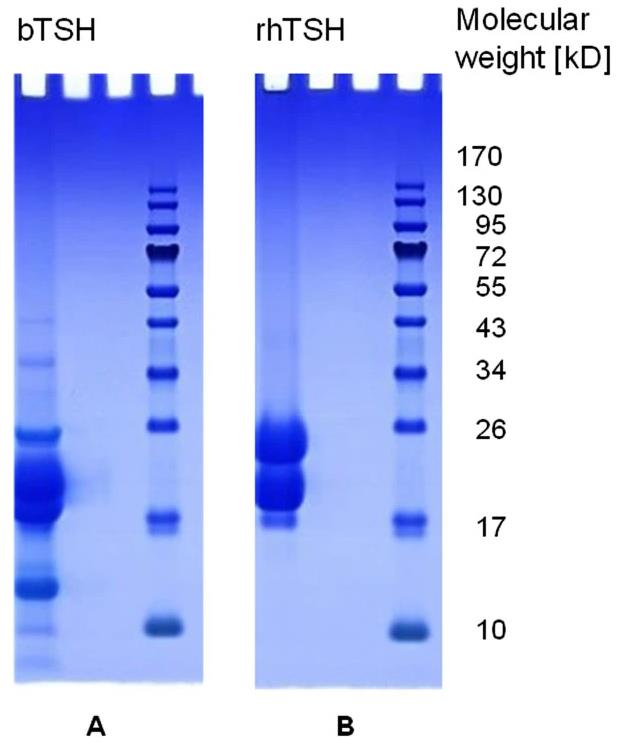
Fig1. Bis-Tris SDS PAGE gel of bTSH (product 1) and rhTSH (each 70 μg/lane). (Sandra Schaefer, 2013)
Not For Human Consumption!
Inquiry
- Reviews (0)
- Q&As (0)
Ask a Question for All TSH Products
Required fields are marked with *
My Review for All TSH Products
Required fields are marked with *



